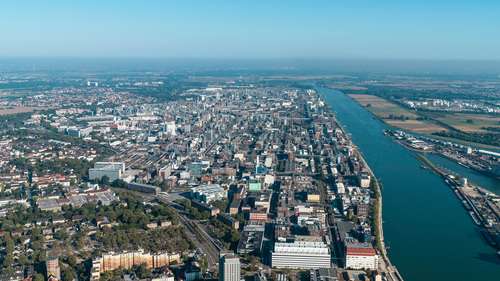BASF puts production plant for Xemium® into operation in Ludwigshafen
Ludwigshafen, October 25th, 2011 – BASF has put a new plant into operation at the site in Ludwigshafen to manufacture the novel active ingredient Xemium, used for the control of fungal infections. With the plant, BASF is reacting to the worldwide increase in demand for crop protection products. The manufacturing process involved, for which a patent is pending, particularly focuses on resource conservation and will thus make a positive contribution to the environment. The new production plant means that 23 new full-time jobs will be created in Ludwigshafen.
“With this investment in the high double-digit million euros, we want to endorse our growth strategy in the field of crop protection. At the same time, we have also committed ourselves to a decision to further expand the production capacity for active ingredients at the integrated site in Ludwigshafen”, explaines Markus Heldt, Head of the Crop Protection Division.
The production plant has been designed such that other active ingredients besides Xemium can also be produced. “The flexible plant design means that we are able to react better to fluctuating demand in different growing regions”, said Harald Rang, Senior Vice President Operations Crop Protection.
The new active ingredient Xemium was developed by BASF to control fungal infections and excels by its high efficacy and outstanding distribution in plants. The fungicide, which belongs to the group of carboxamides, makes it possible to increase crop yields and at the same time to achieve an improvement in quality. In broad-based trials, together with independent research institutes of agricultural organisations, Xemium proved convincing in its ability to control diseases in all important arable crops, such as, grain, soybeans and maize. The new active ingredient has also displayed a strong protective effect in use with fruit and vegetable crops.
BASF Crop Protection has applied for the registration of Xemium worldwide. The new fungicide will be available to farmers throughout the world to support their harvests as soon as national authorities have approved its registration. The first registrations in Europe have already been approved in France, Germany and the United Kingdom. One of the first products for the European cereal market is Adexar®, a combination product with the active ingredients Xemium and Epoxiconazole. The company believes Xemium be a blockbuster and estimates a peak sales potential of the products containing Xemium at over 200 million Euros.
BASF has been working with agricultural customers worldwide for almost 100 years, in order to increase agricultural yields regarding harvest volumes and quality.
Categories
Investments
2009-01-01
at BASF SE, Ludwigshafen (DE)Countries
Companies
Latest news
INEOS launches €250m investment supported by the French Government to secure the future of French industry at Lavera
The project marks the first phase of a long-term regeneration plan to reduce emissions, boost reliability, efficiency and competitiveness, with support of the French State.
Hycamite’s technology to decarbonize shipping awarded AiP by industry leader DNV
Kokkola Industrial Park →Hycamite’s proprietary Thermo-Catalytic Decomposition (TCD) technology offers a new approach to producing clean hydrogen by breaking down methane, the primary component of liquefied natural gas (LN...
Clariant catalysts will power the Ecoplanta: Europe's first waste-to-methanol plant
Chemmed Cluster Tarragona →Repsol is building Europe’s first plant to produce renewable methanol from urban waste The facility will use Enerkem gasification technology to produce 240 KTA of methanol Clariant will supply cata...
Lilly plans to build a new $3 billion facility to boost oral medicine manufacturing capacity in Europe for patients worldwide
Netherlands site will bring 500 manufacturing and 1,500 construction jobs while further strengthening Lilly's global supply chain

